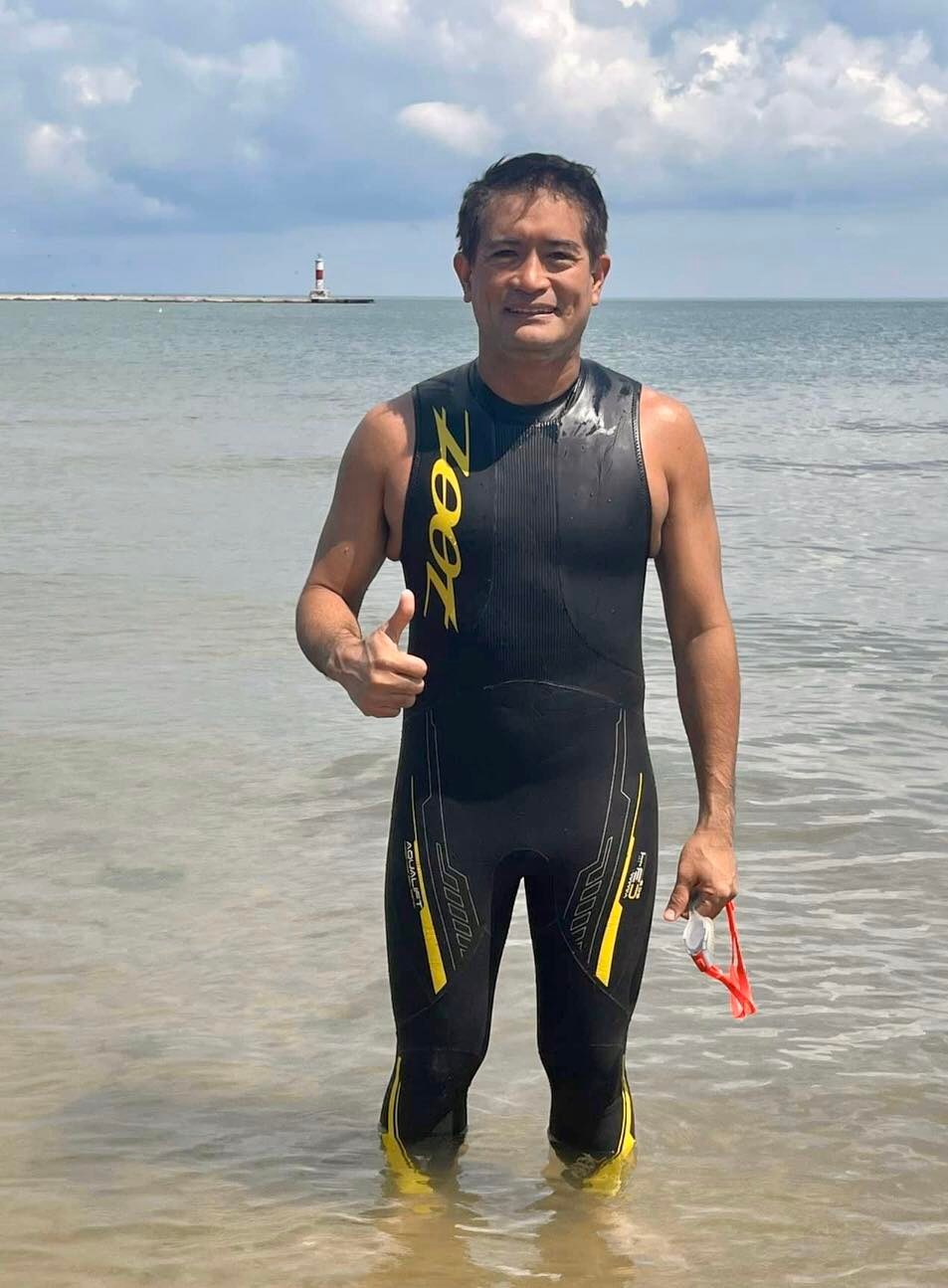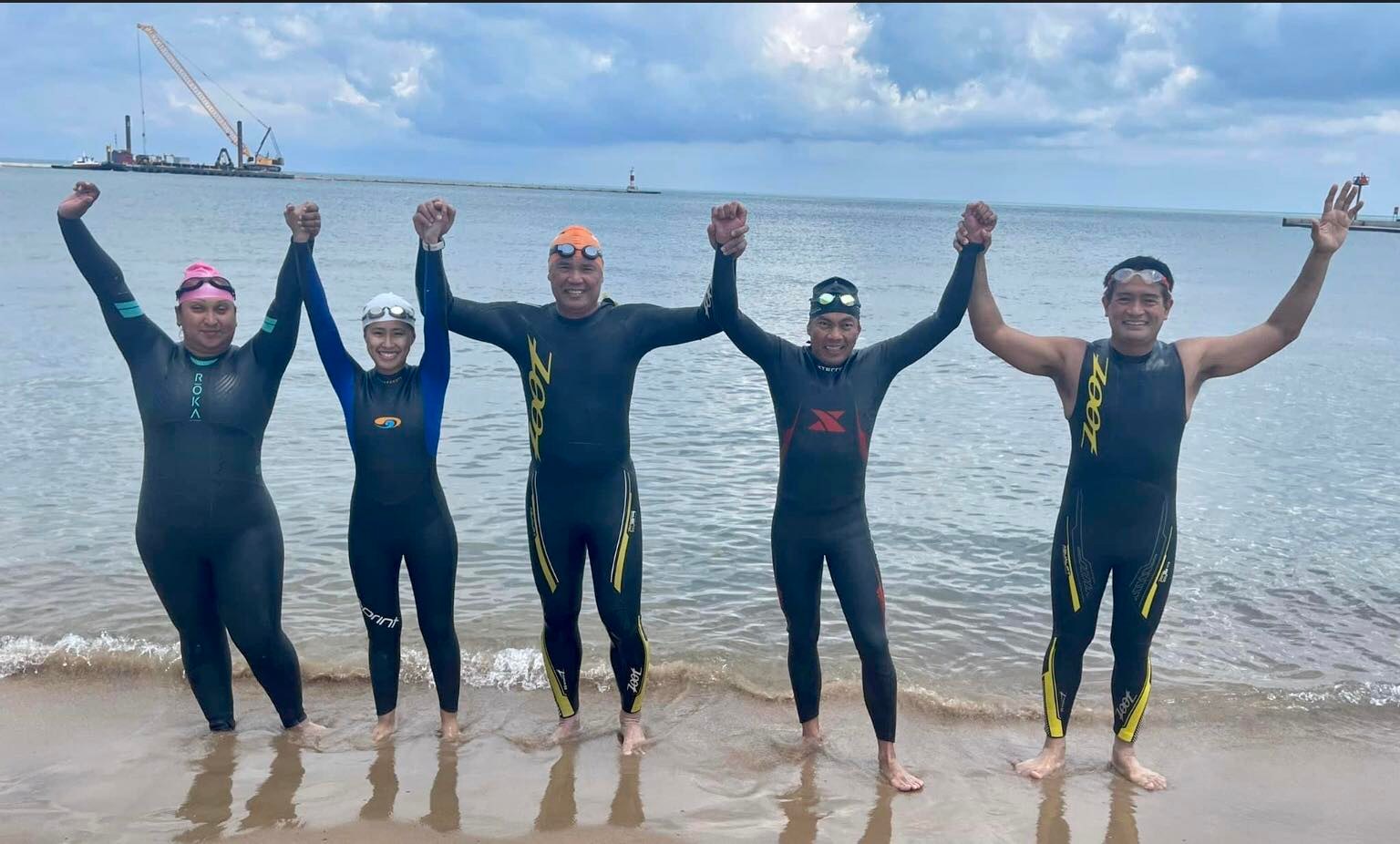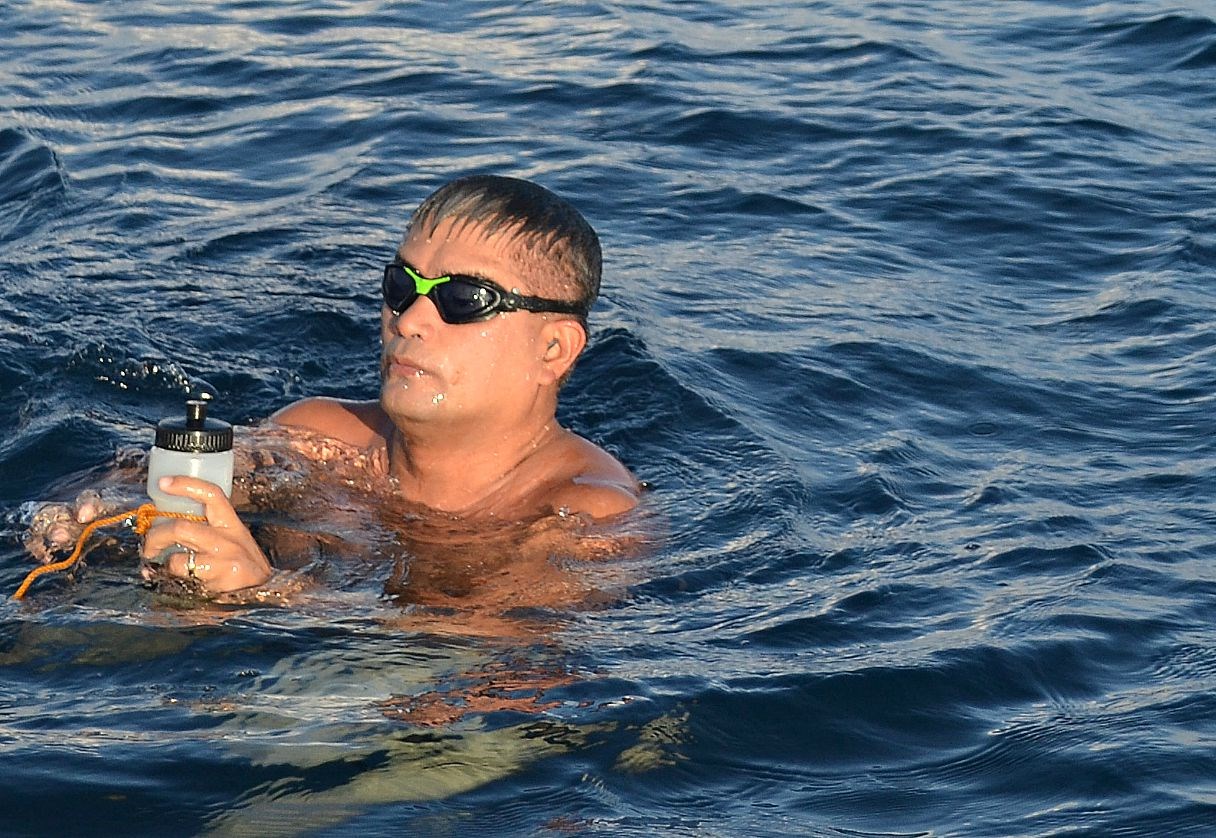Text by Henrylito D. Tacio
Photos courtesy of Ingemar P. Macarine
The marathon swimming at Lake Michigan last Sunday morning (July 24) took exactly two hours and 57 minutes. But instead of 10 kilometers as planned, they covered only half of that.
“We had to shorten the swim from the planned 10 kilometers because of bad weather conditions,” said Filipino endurance swimmer Ingemar P. Macarine. “Only Rey Letada and I completed the swim.”
Letada is a Filipino-American multi-sports enthusiast. The three others – Nick Regorgo, Cynthia Garcia, and Kylee Marie Guiriba – are all neophyte open-water swimmers.
“The three had to get out of the water early part of the swim for safety reasons,” Macarine disclosed in his Facebook post. “They only resumed swimming when the waves slowed down a little.”
According to Macarine, the swimming took longer “because we only had one escort boat.” As a result, “we had to wait for the other swimmers and finish the swim together.”
The weather was another obstacle. “The water temperature during the swim was 62 degrees Fahrenheit,” Macarine said. “I did not have enough cold acclimatization training so the water felt so cold. The wet suit helped but it could only protect the covered part of my body.”
Just like in his previous swims, Macarine followed the rules set by the English Channel Swimming Association (such as no floating aids of any kind, regular swim suits only, and no physical contact with another human being or with the boats).
“After a long hiatus due to the pandemic, I’m back,” Macarine told journalist Roel Catoto, who wrote a report for the Rappler days before the actual swim.
The purpose of the swim, Macarine said, was “to promote marine conservation in the Philippines” and to follow “a healthy lifestyle.”
The swim was also “in memory of a good friend and fellow open-water swimmer, Lisa Amorao.” She passed away in May 2022 during an open-water swim in California.
Macarine ended his post with these words: “Thank you, Lord, for a successful swim. Though the weather did not cooperate today, we really enjoyed the swim.”
In 2015, Macarine was named by international conservation group World Wildlife Fund for Nature-Philippines as one of its Environmental Heroes. He was cited for raising environmental awareness by “pioneering solo channel swimming in the Philippines to promote marine conservation.”
“I was really surprised when I learned that I was a Hero of the Environment awardee,” Macarine said in an exclusive interview. “It was my first national award and the fact that it was from the largest conservation group in the world.”
According to him, he swims to promote his lifetime advocacy for clean seas and beaches. “I want to swim long distances to inspire Filipinos to care more for the marine environment,” pointed out the man who grew up in Surigao.
Macarine has done some endurance open-water swims in some of the dangerous channels around the country and in the United States.



Let’s take a closer look at what he has accomplished so far. On December 30, 2013, he became the first man to swim from Basul Island to Surigao City – about 4.2 kilometers in a matter of two hours. Two months later, he swam from Hikdop Island to Surigao City, some 12.8 kilometers away from each other, in just 3 hours and 38 minutes.
He was the first man who attempted to swim from the Visayas to Mindanao by swimming from San Ricardo in Southern Leyte to Surigao City. Although the swim was unsuccessful, he made a personal record of swimming 23 kilometers in 5-and-a-half hours. This was in May 2014.
On June 15, 2014, Macarine became the first man to conquer the Babuyan Channel by swimming from Palaui Island to Sta. Ana of Cagayan. The distance was 7.2 kilometers, and he did it in two hours.
The 13.4-kilometer distance from Balicasag Island to Panglao Island, both located in Bohol, was swum by Macarine within 6 hours and 45 minutes on October 16, 2014. It took him 7 hours and 45 minutes to swim the 19.99-kilometer distance from Santa Fe, Bantayan Island, to San Remigio in Cebu. He did it on April 12, 2015.
In May 2015, he made a record as the first man to conquer the 12.95-kilometer Sarangani Bay by swimming from Maasim to Glan. He wanted to promote Sarangani Bay tourism and for clean seas and beaches.
In support of the UN Paris Climate Change Summit, he completed a 2-way crossing from Treasure Island Resort in Pangangan Island, Calape, to Cabilao Island in Loon, Bohol, and then back to Pangangan Island with a total distance of 6.4-kilometer in two hours.
On April 20, 2017, Macarine crossed Tañon Strait from Silliman Beach in Dumaguete to Barangay Tambisan in this town covering a total distance of 24.65 kilometers in 11 hours and 21 minutes. That was his longest swim.
In the United States, Macarine became the first Filipino to swim from Alcatraz Island Penitentiary to San Francisco City in California. With a distance of 2.7 kilometers, he accomplished it in only one hour. He was also the first Filipino and second man in history to swim across the 8.1-kilometer Chesapeake Bay from Bay Bridge Marina to Sandy Point Park Beach in Annapolis, Maryland.
From 2016 to 2017, Macarine put his physical limits to the test when he attempted to swim the 21-mile English Channel between Dover, United Kingdom, and Calais, France. He failed in both attempts.
“(It) is considered as the Mount Everest of open water swimming,” Macarine said at that time. “Less than 2,000 swimmers from all over the world have conquered it. But there’s no Filipino yet. We will prove (to the world) that we can also do it.”
The intrepid swimmer pioneered the open-water crossings in the country. Like other sports or hobbies, open water swimming has its woes. “The hardest part when it comes to open swim training are the jellyfishes,” he said. “Since I need to swim in the open water, I have no choice but to endure the stings.”
Macarine is a man who never says never when it comes to opportunities and challenges. This must be the reason that at one time, a friend called him “Pinoy Aquaman,” as the Filipino counterpart to the fictional superhero appearing in American comic books published by DC Comics.
“Jesse James Sombrado, my triathlete friend from Surigao City, first called me as such and it just stuck,” he admitted. “And some media picked it up.”
Macarine was only eight years old when he started swimming in the coastal towns of Malimono and Placer in Surigao del Norte (where he was born). “My friends and I went swimming right after school,” he said. “I just love the water.”
He said it was his father who taught him how to swim. During his college days, he joined the Silliman University Varsity Swim Team and was taught by his coach, Thata Pinero, the basics of competitive swimming.
“When I was a member of the swimming team, I did join up to regional level,” he recalled. “But I was a slow swimmer in the pool. Today, I don’t usually join open water swim competitions. What I do is solo channel crossing. I only do endurance swims like 10 kilometers or more of open water swimming.”
Macarine seems to be born for the water. But he is a lawyer by profession. He said he took up law because he was greatly influenced by his hero, who happened to be his father, Ignacio Macarine, now a retired judge. His mother, Marilyn, used to be a public school teacher.
He took up Bachelor of Arts (major in Political Science and Psychology) at Silliman University in Dumaguete City and finished his law at Arellano Law Foundation in 2002. He took the bar examination the following year and passed it. He is currently a Department of Justice prosecutor in Bohol.
If he has to choose between swimming and being a lawyer, he would prefer the latter. “My open water swimming is just a passion and a way to promote my environmental advocacy,” he said. “I just want my children, Lance and Colyn, to experience the pristine waters that I enjoyed when I was growing up in Surigao.”
To keep himself fit, he said he sleeps a minimum of 8 hours a day – especially during training days. “I do this in order for my body to recover immediately,” he said. “And also, a two-hour massage for three days a week. I also jog for one hour, three times a week.”
Ingemar has been a vegetarian for almost five years now. But a few months ago, he started eating fish again. “No pork, beef, or chicken for me,” he said.
Like most sports personalities, he doesn’t smoke. He stopped drinking alcohol five years ago. “I adopt a zero-alcohol life. I want to promote a healthy lifestyle among my fellow lawyers,” he explained.
When asked if he were a fish, what he would be, he replied: “I would like to be the great white shark. This particular shark species is one of the endangered ones as they are being hunted by man for shark fins, teeth, and as a trophy for sport fishing.
“Just like our marine environment is being threatened by water pollution, overfishing and global warming,” he further said, “I would like to swim also for shark protection.”

